Reviews
Stuart Gordon
USA, 1986
Credits
Review by Jordan Holtane
Posted on 21 May 2012
Source MGM DVD
Related articles
Reviews
From Beyond (by Matthew)
Categories Favorites: Transformations
The work of H.P. Lovecraft has captured readers for nearly a century, despite its aloofness and descriptive density. It’s not hard to understand why, as he dealt with fascinating and macabre themes: cosmic dread, mutability of the physical form, and the limits of perception. However, the nature of his writing has made film adaptations of his work extremely tricky. Arguably, Stuart Gordon has made the most satisfying and provocative examples, because he’s able to maintain Lovecraft’s vast, philosophic concerns, albeit treated with pulp-flair and dark humor. In From Beyond, Gordon, in his own feral auteur way, presents the same rhetorical questions as Lovecraft does in the original story. Throughout the film, the hideous, terrifying transformations the characters undergo, both physically and mentally, seem to suggest the position that we are only what we can perceive, that to be opened up to another sense would make us more than human.
The film begins with a devilish cold open that condenses the source material into a seven-minute pre-title sequence: Two scientists, Drs. Edward Pretorius and Crawford Tillinghast, power up some complex machine in the attic of an old mansion. The machine, called the Resonator, vibrates, awakening the dormant pineal gland (itself a real-life mystery of the human body) and revealing a new, horrifying dimension of perception, one alive and crawling with alien creatures. Pretorius, mastermind behind the Resonator, seems erotically charged, concerned not about the monstrosities around him, but in the pleasures to be gained through this new sense; he is intensely and frighteningly obsessed. A neighbor stumbles in, concerned about the noise, just in time to find Tillinghast panicked and fleeing, and Pretorius with his head bitten off by some otherworldly thing. Tillinghast is arrested for the ostensible murder of Pretorius, and is later released into the custody of Dr. Katherine McMichaels and Detective Bubba Brownlee. The three return to Pretorius’ mansion to verify Tillinghast’s unbelievable account. Needless to say, his unbelievable account is verified; after activating the Resonator, they encounter a transformed Pretorius. “Bodies change,” he tells Tillinghast, who is desperately pleading with the metamorphosed scientist, trying to still make some sense of this new awareness. “Whatever you are, you’re still Edward Pretorius. You’re still human!” Pretorius corrects him, “More than human.” Pretorius has seen beyond the veil through his new sense, equipped through death to understand his change, and is now something beyond human. His sphere of perception has grown and is so unbound to this existence. The three characters are also changed, by the residual effects of the Resonator and by their encounters with the beings: Tillinghast begins to undergo awful physical changes, Katherine becomes imbued with a rabid sexual electricity (the pineal being at least partially responsible for the regulation of sex drive), and Bubba vomits. The machine gets powered on a few more times, unleashing more and more with each activation.
Eventually, with Bubba dispatched by some monster bugs, Katherine escapes back into town with Tillinghast, whose pineal gland has been wildly stimulated and is now growing like a “dog’s dick” out of his forehead (Gordon relays this observation in the DVD commentary). He, like Pretorius, has been transformed into something other than human, something he does not understand. He has an uncontrollable, insatiable craving for brains; there’s a masterful moment in which Tillinghast is caught eating a human brain at the hospital. “They’re delicious,” he moans, but then, looking aghast and confused at himself, asks “God, what is happening to me?” It’s an amusing, yet tragic moment that illuminates the theme presented in the original Lovecraft story: if we push the boundaries of exploration, we may learn things that change who and what we are. It’s a terrifying idea, and yet one that draws our evolutionary, thirsty minds like a moth to flame.
From Beyond is a lurid, gleeful extrapolation of the source material, serving a phalli-filled visual feast, a psychedelia nightmare saturated in neon-purple. It revels in ghoulish and excessively gory set-pieces, plumbing the imagination for otherworldly forms, somewhat recalling Cronenberg’s body horrors and gruesome prurience. However, it transcends mere schlock in centering around characters that are changed from their initial forms, forced to try and comprehend their new existences through confusion and terror. Gordon allows the viewer to observe them react, failing to understand their transformed being. Again, like the Lovecraft short story, it provides a jumping-off point for some serious consideration of what it means to be human. From the creeping dread of the opening sequence to the unsettling ending that sees Katherine, lapsed into insanity by her experience, laughing wildly, madly in the night, it’s faithful to Lovecraft’s assertion that knowledge changes us, that in peeking into the unknown we can never go back to the way we were before. Tillinghast, in trying to explain Pretorius’ motives behind creating the Resonator, says that “five senses weren’t enough” for him; “he wanted more.” It says the limits of our senses, our range of perception, make us what we are; to know more—to, for example, have some dormant sense suddenly switched on, is to be transformed into something new, something “more than human.”
More Favorites: Transformations
-
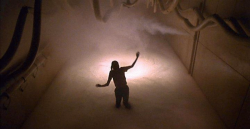
Altered States
1980 -
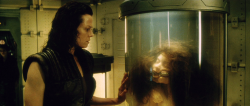
Alien: Resurrection
1997 -
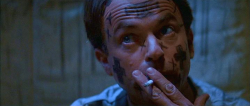
In the Mouth of Madness
1994 -

Now, Voyager
1942 -

Honey, I Shrunk the Kids
1989 -

The Toxic Avenger
1984 -

Teen Wolf
1985 -

Teen Wolf Too
1987 -

An American Werewolf in London
1981 -
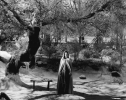
The Curse of the Cat People
1944 -
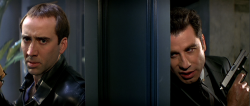
Face/Off
1997 -

That Obscure Object of Desire
1977 -

Now, Voyager
1942 -
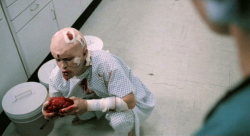
From Beyond
1986 -
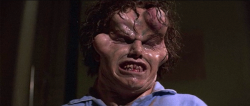
The Beast Within
1982 -

The Family Man
2000 -
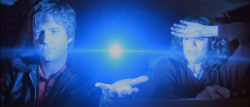
Starman
1984
We don’t do comments anymore, but you may contact us here or find us on Twitter or Facebook.



